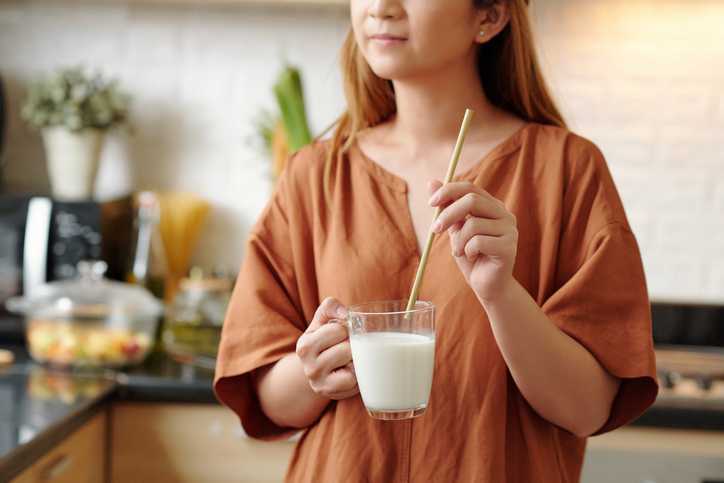- Plant-based milks can be a safe and healthy choice from childhood to adulthood.
- The popularity of plant-based milks is growing.
- Having a dairy allergy, being lactose intolerant, or having ethical and environmental values are reasons people may choose to switch to a plant-based milk.
- Soy milk is the plant-based milk that comes closest to the nutritional profile of cow’s milk.
- When choosing a plant-based milk, opt for one that is fortified with calcium.
5 minute read
Long gone are the days when cow’s milk was the only choice at the supermarket. Plant-based milks have emerged as a non-dairy alternative to cow’s milk, and can be a safe and healthy choice from childhood to adulthood.
Whether it is soy milk, or almond, cashew, rice, coconut, oat, and even pea milk, there is no shortage of choice.
Plant-based milks are often referred to as dairy alternatives. They are often fortified with key nutrients such as calcium, iodine, vitamin B12 and vitamin D to support health.
To ensure you're getting enough calcium from plant-based milk, the Australian Guide to Healthy Eating recommends aiming for 100 mg of calcium per 100 ml.
Plant-based milk alternatives may have different nutrition profiles. It's important to read and understand the nutrition panel so that you can make the best choice to suit your needs.
However, it's wise to always choose a calcium-fortified variety. Fortunately, this is most products these days. If you follow a vegan diet, you may also look for one that contains vitamin B12.
And if you follow a plant-based diet, include a range of colourful and seasonal fruits and vegetables, along with plenty of grains, cereals, legumes, nuts and seeds, to ensure your diet is nutritious and adequate.
Soy milk
Soy milk is made from either ground soybeans or soy protein powder. Soy milk is a good source of protein and generally contains more protein than other plant-based milk alternatives.
And since most soy milk is fortified with calcium, it tends to be most similar to cow’s milk.
Many soy milks also contain added vitamin B12 which is important for people following a vegan diet who are at risk of being deficient in this nutrient.
Almond milk
Almond is made from ground almonds. Commercial almond milks vary in their almond content, containing between 2 to 14 percent almonds. Some may contain sweeteners although many no-added-sugar varieties are available.
Almond milk is lower in energy and saturated fat compared to dairy milk. It is also generally very low in protein with a typical serving containing just one gram of protein per serving.
However, recently there are varieties that have added protein – up to 10 g per 250 mL. Compare that to cow’s milk which has around eight grams of protein per serving.
Almond milk is soy, lactose and dairy-free. That makes it suitable for people who are allergic or intolerant to soy or dairy, or who are lactose intolerant.
If you’re using almond milk as an alternative to dairy milk, look for ones that are fortified with calcium, vitamin B12, and vitamin D, as a minimum. Fortunately, this is most products on the market these days.
Oat milk
Oat milk is made by blending oats and water and then straining off the liquid. It is low in saturated fat.
Unlike most plant-based milks, oat milk is a good source of fibre as it contains beta-glucan. Beta-glucan has been shown to help reduce cholesterol and to help control blood sugar levels.
Oat milk is naturally sweet because of its higher carbohydrate content compared to cow’s milk. Because of its properties, oat milk can be a good substitute for cow’s milk in cooking.
Oat milk is the creamiest of the plant-based milks and is a good choice in dishes that need a creamy consistency.
With an average of only four grams of protein per serving, oat milk has about half the protein of dairy milk. Oat milk tends to be low in calcium so choose one that is calcium-fortified. Also choose one that has been fortified with higher amounts of protein.
Oat milk is not gluten-free.
Rice milk
Rice milk is made from milled brown rice and water and is allergen free. During processing, many of the carbohydrates in the rice break down into smaller sugars resulting in its distinctive sweet taste.
Rice milk is the least likely of the plant-based milks to be a trigger for an allergy.
When choosing rice milk, look for a protein and calcium fortified option aiming for 100 mg of calcium per 100ml.
For parents of growing infants, rice milk is not a suitable alternative due to the low protein content. Infants should be exclusively breastfed for a minimum of 6 months.
If beverages like almond or rice milk are a regular part of a young child’s diet, other food sources of protein and energy are needed to ensure a healthy, balanced diet. For guidance visit a vegan or plant-based paediatric dietitian.
Macadamia milk
Macadamia milk is a made by blending soaked macadamia nuts with water. Macadamia milk is naturally low in protein and calcium. Most of the fat in macadamia milk is the more healthy unsaturated type.
Because of its creamy texture, macadamia milk can be good swap for dairy milk in cooking and hot beverages. Macadamia milk can be fortified with vitamin D, vitamin B12 and calcium, making them better choices as a swap for dairy milk.
Pea milk
Pea milk is made using pea protein extracted from peas usually in combination with water, sunflower oil, and some other nutrients for fortification like vitamin B12. The protein content of pea milk is similar to dairy milk.
Hemp milk
Hemp milk is made from blending hemp seeds taken from the hemp plant with water. Importantly, hemp milk does not contain any of the psychoactive substances found in marijuana.
Compared to whole dairy milk, hemp milk has fewer kilojoules, protein, and carbohydrates. It is also a good source of omega-3 fatty acids. Commercial hemp milk is often fortified with calcium, vitamin B12 and vitamin D making these ones the better one to choose.
Coconut milk
Coconut milk is made by diluting coconut cream with water. Coconut milk is lower in carbohydrate and protein and higher in saturated fat compared to dairy milk. It is low in calcium so choose one that has been fortified.


Making a shift to a more plant-based diet can be healthful and nutritionally adequate as long as it's well planned to meet your nutritional needs. An Accredited Practising Dietitian (APD) can help you meet your individual needs.
We recommend seeing a dietitian if you:
- have recently moved to a vegan diet and are no longer eating or are cutting out dairy foods
- are vegan or vegetarian and unsure how to meet your calcium, iodine and protein needs
- are struggling with symptoms of a dairy allergy, milk intolerance or lactose intolerance
- have been diagnosed with lactose intolerance and want some support with the dietary management of this condition
- need nutritional advice to help ensure you're meeting your individual nutrient requirements
- if you have specific nutritional needs, such as during pregnancy or for infants and children.
Accredited Practising Dietitians (APDs) are university-trained nutrition experts. They can help you with personalised, easy-to-follow and evidence-based advice.
APDs are Australia's most trusted dietetics professionals.
- Read the nutrition label to ensure you are getting the best option to meet your specific needs.
- Choose a plant-based milk that has is fortified with calcium as a minimum - but many have other vitamins and minerals added too.
- Be open to experimenting with different plant-based milks to achieve your desired taste and food consistency experience.